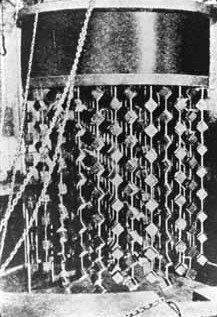If they all know this, why did Halifax, the second most powerful politician in the country, literally try to bring down Churchill in order to start negotiations? Doesn’t seem like a fringe view at the time at all.The problem with that is the British know perfectly well that Hitler's promises are worthless. There's no point in making a deal with someone that you know won't honor the deal.
Do you think the United States should declare war on Germany and send our army and navy abroad to fight?American public opinion turned against isolationism in 1940. Gallup polls taken that year show that even as early as March of 1940, there was already a majority (55%) of the American public that wanted the US to loan money to Britain and France if that was necessary to keep them from losing to Germany and thereafter there was consistent majority support for the US giving aid to the Allies. A May 1940 poll showed a majority (51%) wanted the US to extend credit to the Allies, a July 1940 poll showed a majority (53%) felt the US wasn't doing enough to help the Allies, a September 1940 poll showed a majority (52%) felt that helping Britain was more important than keeping the US out of the war, and an October 1940 poll showed 60% wanted the Neutrality Acts repealed so that US ships could directly carry war supplies to Britain.
http://ibiblio.org/pha/Gallup/Gallup 1940.htm
Yes................................ 6%
No..............................94
Ummm…
By not having any forces tied to the West after the UK made a deal.How exactly are the Nazis taking Moscow in 1941? IOTL it took all their strength just to get to the outskirts of the city, so how exactly are the Germans, who are at the end of their tether, going to take the most heavily defended city on Earth in the face of an incredibly nasty winter?
And why would Japan attack the Soviets? The resources Japan desperately needs are in the south, and they really didn't enjoy their last experience tangling with the Red Army, so there is no reason for them to go north.
Japanese involvement is not necessary, but could easily be the result of a promise by Germans to help supply them with oil after Soviet defeat. The fear of Soviets would just as well be a motivator to strike them while they are weak.
I’ll admit that this one is a bit more speculative, though it is also not a necessary condition for Axis victory, which is effectively achieved at this stage. But less Soviet and no Western resistance leaves far more resources for developing new kinds of weapons, which the Nazis were clearly adept at doing even at very difficult times. And if it doesn’t happen in 1946, it seems implausible it wouldn’t happen by the ’50s. And since US hasn’t declared war, simply having the bomb as a defence against invasion is a powerful deterrent.Wait, what? How is Germany getting the atomic bomb by 1946? The German atomic bomb project was an underfunded joke that never came close to producing a bomb and was pretty much abandoned by 1942 as Hitler was much more interested in developing long range rockets.

German Atomic Bomb Project - Nuclear Museum
“I don't believe a word of the whole thing,” declared Werner Heisenberg, the scientific head of the German nuclear program, after hearing the news that the United States had dropped an atomic bomb on Hiroshima.Germany began its secret program, called Uranverein, or “uranium club,” in April 1939...www.atomicheritage.org
Furthermore even if you flat out gave the Germans atomic bombs, they don't have any bombers or rockets capable of carrying such heavy weapons, so how are they going to threaten the United States with their atomics? About the best they could do is load an atomic bomb on a u-boat and have it try to sail across the Atlantic (in the face of the US and Royal Navies), sneak into an American port and suicide bomb itself, but that's not exactly a reliable delivery method, and it still leaves the Nazis with no way to strike at the American interior (where most of the US industry and population is.) Furthermore, if the Germans ever succeed in such an attack, the US will then simply turn every German u-boat base into radioactive slag, which will leave the Germans with no way at all to strike at the US with atomic weapons, while the US atomic arsenal just keeps getting larger and larger.
Last edited: